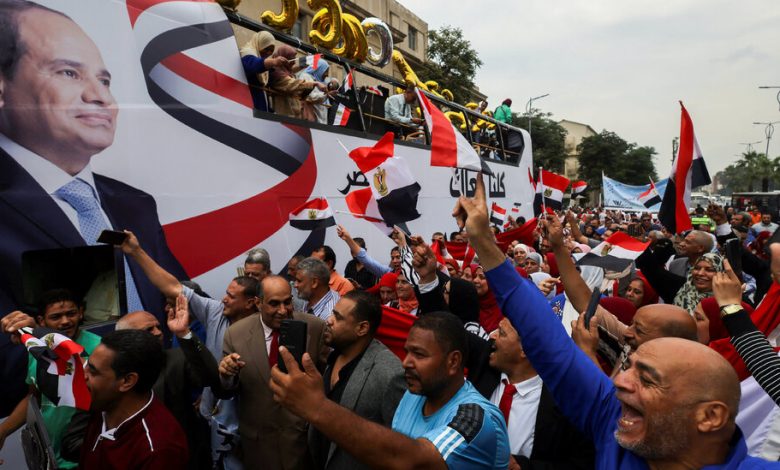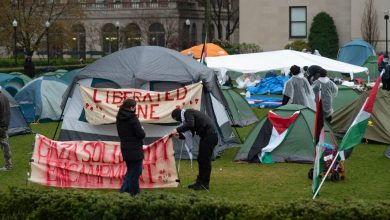As Egypt’s Presidential Vote Nears, Dissent Flickers Around el-Sisi

Songs in praise of Egypt’s military were blaring and banners emblazoned with President Abdel Fattah el-Sisi’s face were waving when a poet took the stage at a government-sponsored rally this week in Marsa Matrouh, a city on Egypt’s Mediterranean coast.
Normally, the poet performs at weddings. This time, he was paying homage to the president, who had, just hours before, announced to great fanfare that he would run for a third term in December’s presidential elections — a vote he is all but certain to win, despite his nose-diving popularity.
After a decade of arresting critics, gagging the media and smothering protests, Mr. el-Sisi has more than a few ways to make up for feeble support. In the run-up to the Oct. 14 deadline to qualify for the ballot, the authorities have used strong-arm tactics that include arresting and beating supporters of his most popular challenger before they can submit the endorsements he needs to formally enter the race. The government has also organized rallies across Egypt to bolster Mr. el-Sisi’s campaign.
In Marsa Matrouh, however, the scripted celebration — populated with local officials and what rights groups say were Egyptians bused in for the occasion — quickly veered off-track, according to videos posted on social media and a local shop owner who saw the rally.
Young men began throwing plastic water bottles at the poet onstage, shouting, “Leave, Sisi,” said the shopkeeper, who asked not to be identified because he feared arrest. Some scrambled onto the stage only to be chased off by security officers. Videos showed protesters tearing down banners and setting them on fire.
Dispersing into the side streets, some young men chanted the name of Mr. el-Sisi’s best-known challenger, Ahmed el-Tantawy. Others in the crowd of protesters, which the shopkeeper estimated to number in the hundreds, shouted the famous slogan of Egypt’s 2011 Arab Spring revolution: “The people want the fall of the regime.”
When those words rang through Egyptian cities in 2011, the country’s president was forced to step down. Egyptians voted in one democratic election, voting an Islamist president into office, before Mr. el-Sisi, a former general backed by the military and buoyed by mass protests, seized power in 2013.
It has been all Mr. el-Sisi ever since. In 2014, he rode a wave of adulation to victory with 97 percent of the official vote. In 2018, when all serious challengers were arrested or intimidated into dropping out, he was re-elected with diminished support but an undiminished 97 percent of all ballots. In 2019, a constitutional referendum set him up to remain in power until 2030, bestowing the right for him to run for a third, extended term in an election originally expected to take place next year.
But the government announced last week that voting would instead kick off in December, a move political analysts and diplomats said signaled the strains on Mr. el-Sisi’s re-election bid, which is playing out nearly two years into a crisis that has pushed Egypt’s economy into free fall.
Despite many promises, Egypt shows few signs of undertaking the serious changes experts say are needed to right its economy. Mr. el-Sisi is likely to win in December only to preside over a country without the money to pay its debts or for basic imports, a situation that analysts say could soon threaten his hold on power.
“This upcoming election is not the end,” said Maged Mandour, an Egyptian political analyst who has written a forthcoming book on Mr. el-Sisi’s rule, “but it might be the beginning of the end.”
Even pro-government voices have warned that Egypt risks dire consequences and social unrest if conditions do not improve.
Two previous currency devaluations have slashed the pound’s value by half since March 2022, after foreign investors fled Egypt in a panic in the wake of Russia’s invasion of Ukraine, leaving Egypt with few dollars to cover increasingly expensive imported wheat and fuel. Inflation has repeatedly hit record highs of well over 30 percent, forcing the affluent to scrimp as almost never before, the middle class to move their children to cheaper schools and forgo meat and the poor, in many cases, to skip meals.
Though economists say Egypt’s underlying economic weaknesses and enormous debt load are the real causes of the crisis and external factors just the trigger, Mr. el-Sisi steadfastly blames the war in Ukraine, among other things. He has also taken to dismissing the pain as trivial compared to the accomplishments of his rule.
“I swear to God Almighty, if the price of prosperity and progress for a nation is that it does not eat and drink, then we don’t eat or drink,” he said when announcing his candidacy on Monday.
Egyptians looking for extra cash, he suggested in the same speech, could always start donating blood once or twice a week.
Such remarks have only darkened a national mood that had already turned against the president, who once enjoyed such adoration that Egyptians threw military-themed wedding parties and adorned everything from pieces of chocolate to fast-food posters with his face.
Even when his star dimmed after a previous economic crisis in 2016, the repressive machinery the president built, in which Egyptians are often arrested for offenses as minor as re-sharing a Facebook post critical of Mr. el-Sisi, helped silence any dissent. These days, however, many Egyptians openly complain about him, saying they regret voting for him before.
Some have flocked to one of his would-be challengers, Mr. el-Tantawy, a former member of Parliament. He responded to Mr. el-Sisi’s statements about going hungry and thirsty on Monday with a post on X, formerly Twitter: “Egyptians actually starved during your rule because of your administration.”
In an interview earlier this year, Mr. el-Tantawy called on the authorities to respect Egyptians’ right to choose their own leader. “If the current regime had the popularity it claims to have, what would be the harm of subjecting themselves to the vote of the Egyptian people and for that vote to be protected?” he said.
Asked whether he had any hope of succeeding, given the government’s history of using repressive tactics during the electoral process, Mr. el-Tantawy said that the security services had “very few tricks” once people overcame their fear of participating.
But there are signs that he may not get as far as the ballot box. The Egyptian Initiative for Personal Rights said last week that at least 73 Tantawy supporters from several Egyptian governorates had been arrested, some after filling out forms to register to volunteer for his campaign, others after simply liking the campaign’s Facebook page.
Candidates have until Oct. 14 to gather enough declarations of support from around the country or nominations from members of Parliament to qualify for the ballot, and two politicians already have. But the Tantawy campaign and opposition politicians have said that when his supporters have gone to notary offices to endorse him, they have faced myriad obstacles.
Some have been beaten or sprayed with water, said Hania Moheeb, a spokesperson for the campaign. Others have been told that the power was out or computer systems down, or otherwise put off.
“Egyptians are being deprived of the most basic right of choosing their representatives,” said Hamdeen Sabahi, a leftist politician who ran against Mr. el-Sisi in 2014, warning, “If the door to safe change is shut for Egyptians, then they will be driven to an explosion.”
Egypt’s National Elections Authority has called these allegations “baseless and false.”
The University of Toronto’s Citizen Lab has found that Mr. el-Tantawy’s phone was targeted with spyware after announcing his presidential bid this year. The group said the Egyptian government was likely responsible.
In Marsa Matrouh, where the protest erupted on Monday night, about 400 people were arrested, the privately owned Egyptian news outlet Al-Manassa reported, citing the head of the local bar association.
But the government played down the unrest. In a statement, the Interior Ministry said security officers had arrested rioters after “a quarrel broke out between some young people” who had been “competing to take pictures” with the poet onstage.



